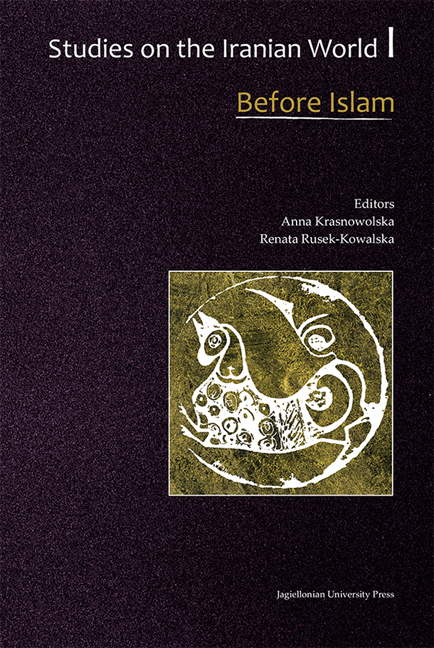Book contents
- Frontmatter
- Contents
- Foreword
- Linguistics
- Literature
- Religion
- History
- Wahrām Čōbīn the Rebel General and the Militarization of the Sasanian Empire
- A Tale of Two Great Kings: Artabanus and Vologaeses
- Realia for Sasanian History: Mint Networks
- New Data on the Development of the Indo-Iranians in the Bronze Age
- Archaeology
A Tale of Two Great Kings: Artabanus and Vologaeses
from History
Published online by Cambridge University Press: 12 January 2018
- Frontmatter
- Contents
- Foreword
- Linguistics
- Literature
- Religion
- History
- Wahrām Čōbīn the Rebel General and the Militarization of the Sasanian Empire
- A Tale of Two Great Kings: Artabanus and Vologaeses
- Realia for Sasanian History: Mint Networks
- New Data on the Development of the Indo-Iranians in the Bronze Age
- Archaeology
Summary
SUMMARY
In the 1st century AD the rise of Artabanus II to the throne of Parthia marks the first substantial attempt to reaffirm the power of the ruling dynasty after decades of crisis. This monarch tried to build up a reformed government system capable of reassigning to the Great King some of his traditional prerogatives through the alliance with political entities alternative to the nobility. The agreement with the Jewish communities proved to be the most effective while the parallel efforts made with the Greek communities resulted at the end in a failure. The new dynasty which came to the throne with Vologaeses I followed the path traced by Artabanus, improving his strategy. Purpose of this paper is to show how much the consolidation of the Arsacid monarchy achieved by Vologaeses owed to the political solutions spotted by Artabanus some years before.
Starting from the publication in 1938 of Debevoise's book Political History of Parthia the Parthian empire gradually began to emerge from the shadows of history to became a better defined political subject whose role and historical importance were no less worth studying than those of the more famous oriental empires which preceded it, like the Achaemenid one, or followed like the Sasanid kingdom.
Of course Debevoise's work presented some indisputable limits. Among these the almost exclusive use of Roman sources, both Greek and Latin. In 53 BC in northern Mesopotamia the Roman legions led by the triumvir Crassus suffered a disastrous defeat. From that time on until the early decades of the 3rd century A.D., the Parthians were considered the only political power which was able to oppose Rome's expansionist goals in the East. This political situation had a significant influence on how the Parthians were perceived by the western people. In fact most of what is nowadays known about the Parthian kingdom history and structure is mainly based on the incomplete and largely stereotyped accounts drawn up by Roman and Greek imperial writers. Since they saw the Arsacids as the ‘eastern enemies’ their interest in their state remained restricted to the provinces of this vast domain lying closer to the Roman borders and to the historical episodes more closely connected with Rome's policy in Western Asia.
Since Debevoise an increasing number of scholars have dealt with Parthian antiquities.
- Type
- Chapter
- Information
- Studies on the Iranian World: Before IslamMedieval and Modern, pp. 203 - 210Publisher: Jagiellonian University PressPrint publication year: 2015



